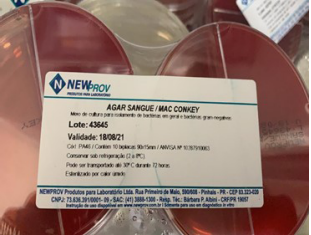Retrospective study of bacterial agents found in urine culture of dogs: antimicrobial sensitivity and resistance profile
DOI:
https://doi.org/10.21708/avb.2022.16.1.10403Resumen
Urinary tract infections are commonly diagnosed in dogs, accounting for 2 to 3% of cases in the clinical routine, as cystitis being the most reported condition. Dogs of all ages and breeds can be affected, and early diagnosis is an important tool for therapeutic success. Urine culture and antibiogram are gold-standard tests for the diagnosis of bacterial cystitis, allowing correct therapy and better recovery of the patient, since currently there is great resistance to antimicrobials used in the veterinary clinics. Thus, the aim of this study was to determine the main etiological agents isolated in dog urine cultures, as well as the resistance and sensitivity profile of the isolated agents in relation to antibiotics, in order to assist the clinician´s choice of the most appropriate antimicrobial, aiming at the patient's therapeutic success. For this study, a retrospective study was performed of 49 samples of urine cultures of male and female dogs, collected between 2012 and 2021, which were positive for bacterial growth. From this analysis, it was observed that Escherichia coli, Enterococcus spp. and Staphylococcus spp. were the most isolated agents, presenting higher antimicrobial resistance to cephalexin, sulfadiazine plus trimethoprim, ampicillin, enrofloxacin and ciprofloxacin, respectively.
Descargas

Descargas
Publicado
Número
Sección
Licencia
Autores que publicam na Acta Veterinaria Brasilica concordam com os seguintes termos: a) Autores mantém os direitos autorais e concedem à revista o direito de primeira publicação, com o trabalho simultaneamente licenciado sob a Licença Creative Commons Attribution que permite o compartilhamento do trabalho com reconhecimento da autoria e publicação inicial nesta revista. b) Autores têm autorização para assumir contratos adicionais separadamente, para distribuição não-exclusiva da versão do trabalho publicada nesta revista (ex.: publicar em repositório institucional ou como capítulo de livro), com reconhecimento de autoria e publicação inicial nesta revista. c) Autores têm permissão e são estimulados a publicar e distribuir seu trabalho online (ex.: em repositórios institucionais ou na sua página pessoal) a qualquer ponto antes ou durante o processo editorial, já que isso pode gerar alterações produtivas, bem como aumentar o impacto e a citação do trabalho publicado (Veja O Efeito do Acesso Livre).


 Esta obra está licenciada com uma Licença
Esta obra está licenciada com uma Licença 